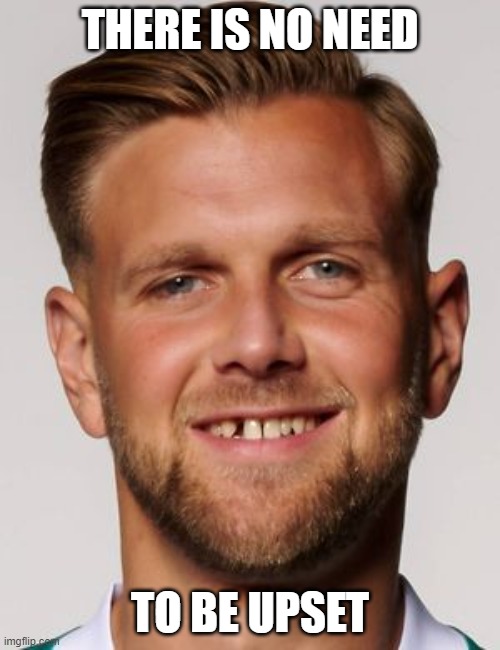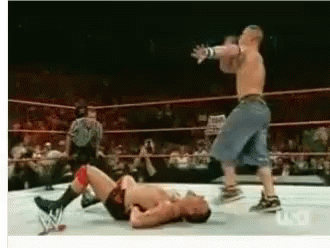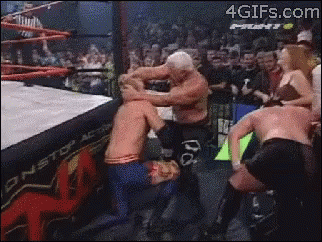You are using an out of date browser. It may not display this or other websites correctly.
You should upgrade or use an alternative browser.
You should upgrade or use an alternative browser.
WORLD CUP 2022 | Rumba Quatar
- Thread starter LiquidMetal14
- Start date
Insane Metal
Member
Hmm Spain definitely has a chance at winning this WC.
I Master l
Banned
Germany out of the World Cup ? 
If they lose i think so right?Germany out of the World Cup ?
AmuroChan
Member
Germany out of the World Cup ?
If they lose i think so right?
To advance, they would need to beat CR by a couple of goals and have Japan lose to Spain.
Last edited:
Bitmap Frogs
Mr. Community
Btw this tuesday USA vs Iran lmao that grouping
dr_octagon
Banned
It will be an enriching game, radiating the stadium with their skills.Btw this tuesday USA vs Iran lmao that grouping
Imagine Dragons singing the US national anthem.
Last edited:
Insane Metal
Member
Holy shit! Holy shit!!!
Bitmap Frogs
Mr. Community
dr_octagon
Banned
LiquidMetal14
hide your water-based mammals
Tie game!
dr_octagon
Banned
John Marston
GAF's very own treasure goblin
I never watch football except during the World Cup.
Can a veteran with more knowledge than me please help out with a noob question?
Is there a culture of diving in the sport?
While most times a foul is clearly apparent, sometimes (especially with the slowmo replays) you see a player barely getting grazed and falling down with the most dramatic facial expression like he was sniped in the back with a .50 cal.
Someone once told me teams actually practice this thing. Is this true?
Thanks for educating my ignorant ass
Can a veteran with more knowledge than me please help out with a noob question?
Is there a culture of diving in the sport?
While most times a foul is clearly apparent, sometimes (especially with the slowmo replays) you see a player barely getting grazed and falling down with the most dramatic facial expression like he was sniped in the back with a .50 cal.
Someone once told me teams actually practice this thing. Is this true?
Thanks for educating my ignorant ass
Bitmap Frogs
Mr. Community
I never watch football except during the World Cup.
Can a veteran with more knowledge than me please help out with a noob question?
Is there a culture of diving in the sport?
While most times a foul is clearly apparent, sometimes (especially with the slowmo replays) you see a player barely getting grazed and falling down with the most dramatic facial expression like he was sniped in the back with a .50 cal.
Someone once told me teams actually practice this thing. Is this true?
Thanks for educating my ignorant ass
FIFA, the corrupt retards who set the rules for worldwide football, have a long established preference for no-camera-assisted referee decisions. As a result, referees have an imperfect view of the action and teams do try to exploit that.
Believe me if I tell you there's no fan who agrees with this, we would all like to see video-assisted referees.
Last edited:
LiquidMetal14
hide your water-based mammals
Great game. Everything has been highly enjoyable this cup minus the 7-0 game.
Bitmap Frogs
Mr. Community
Great game. Everything has been highly enjoyable this cup minus the 7-0 game.
I beg to disagree.
StreetsofBeige
Member
I've had this conversation with soccer friends. It's not just about trying to draw a foul call. But also a way to kill time to end the game as well as give their players a breather. Since time keeps ticking, there's only so much extra time a ref will add to the clock.I never watch football except during the World Cup.
Can a veteran with more knowledge than me please help out with a noob question?
Is there a culture of diving in the sport?
While most times a foul is clearly apparent, sometimes (especially with the slowmo replays) you see a player barely getting grazed and falling down with the most dramatic facial expression like he was sniped in the back with a .50 cal.
Someone once told me teams actually practice this thing. Is this true?
Thanks for educating my ignorant ass
Faking calls can happen in every sport. But the key reason why it persists in soccer is because the game allows it. In other sports if you try to dive, a ref will call an unsportsmanlike penalty. In soccer nothing happens. And soccer fans dont seem to care as "it's part of the game". If this kind of thing happened in NBA, NFL or NHL, everyone from analysts to fans would be calling this shit out. And ref would be giving out diving penalties every 2 minutes.
I don't watch soccer at all except world cup, olympics and if an MLS match is on TV by chance, but out of all the dives I've seen, I have literally seen a ref give out a yellow card once to the diver. So it can happen. What ever that player did must had pissed off the ref so much he actually gave a yellow card. If refs gave out more penalties, the dives would drop like a rock. But the refs dont so it's in the player's best interest to just fall knowing the chances of the ref giving a penalty to him is like 0.001%. You dive and get the call, or you dive and nothing happens. So a player might as well dive.
Also, I dont know how true this is but dependng on the culture or league diving is more accepted than others. My friends would tell me Latin/South American teams dive a lot. So does Italy. But USA and Asian teams don't much. Not sur where popular teams like England, Germany, France are on that scale.
Bo_Hazem
Banned
MidGenRefresh
*Refreshes biennially
Moroccans were "celebrating" in The Netherlands and Belgium.
As expected.
As expected.
LiquidMetal14
hide your water-based mammals
Highlights
dr_octagon
Banned
Football players do it as a reference to the Simpsons.






Yeah, not sure DeBruyne is great with that attidude for the locker room.
One of the best players in the world, but if he thinks this way he should retire from the national team. Helps nobody.
Last edited:
Batiman
Banned
He's always been downplaying Belgium. Even before when Italy beat them at the euros he said they were not a top team compared to the Italians and others. Which is honestly bullshit looking at the squad. Especially 2 years ago.
He's one of the greatest right now but the way he talks about the national team totally shuts down any hope for the fans.
El Pistolero
Banned
Neymar used to dive like a fucking salmon trying to get back to the source.
Last edited:
The Fartist
Gold Member
All the people confused or calling out, making fun of the diving in the sport, I get it, I hate it just as much, if not more. But you have to understand, the high stakes at play, the emotions, the pressure, and above all else the obsessive desire to win. Soccer (fuck you, I call it soccer) is a tiny allegorical sliver of life and the human spirit with all of its imperfections.
I wish I could articulate it a little better, that's just how I see it.
I wish I could articulate it a little better, that's just how I see it.
StreetsofBeige
Member
Funny thing is one of my coworkers who knows the most about soccer out of all of us at work told some of us before the WC started Belgium is overrated and too old.
Last edited:
AJUMP23
Parody of actual AJUMP23
I bet they make good waffles.
StreetsofBeige
Member
I think most of us understand why they do it. Problem is they keep doing it because the ref does nothing about it.All the people confused or calling out, making fun of the diving in the sport, I get it, I hate it just as much, if not more. But you have to understand, the high stakes at play, the emotions, the pressure, and above all else the obsessive desire to win. Soccer (fuck you, I call it soccer) is a tiny allegorical sliver of life and the human spirit with all of its imperfections.
I wish I could articulate it a little better, that's just how I see it.
If hockey players were allowed to fake getting tripped or cross checked and the refs never call an unsportsmanlike penalty (combined with a $$$ fine), they'd keep faking it. But in every other sport, diving fouls are called if players fake it. So there's no point in diving. That doesn't mean it never happens, but rare. I could probably watch 10 hockey games in a row of people getting plastered by slashes, trips and getting rammed into the boards. The number of players faking crumbling in pain hoping to draw a penalty is rare even though the opportunity to draw one is every 10 seconds as it's a contact sport. Powerplay goals are roughly a 20% success rate. So you'd think trying to draw penalties would happen every minute with people faking it. But they cant because the ref will give that player a penalty for embellishment (diving).
I was right (my above post), refs can give divers a yellow card. I've seen it once in my life. The rule is there, but they dont do it.

Diving (association football) - Wikipedia
Diving as deceptive behaviour[edit]
In 2011, researchers studying signalling in animals examined diving in the context of communication theory,[16] which suggests that deceptive behaviour should occur when the potential payoffs outweigh the potential costs (or punishments). Their aim was to discern when and where diving is likely to occur, with the aim of identifying ways to stop it.The researchers watched hundreds of hours of matches across six European professional leagues and found that diving is more likely to occur a) near the offensive goal and b) when the match is tied. None of the 169 dives seen in the study were punished.
It was also found that diving was more common in leagues where it was rewarded most – meaning that the more often players were likely to get free kicks or penalties out of a dive, the more often they dived. This suggests that the benefits of diving are far outweighing the costs, and the only way to reduce diving in football is by increasing the ability of referees to detect dives and by increasing the punishment associated with them.
Dr. Robbie Wilson, a member of the group that conducted the study, said: "Some progressive professional leagues, such as the Australian A-League and the American MLS have already started handing down punishments for players found guilty of diving. This is the best way to decrease the incentive for diving".[17]
Some have referred to simulation as a menace to footballers with real, sometimes life-threatening, injuries or conditions. On 24 May 2012, English FA referee Howard Webb spoke to a FIFA medical conference in Budapest about the importance of curbing simulation in football, as players feigning injury could put players with serious medical issues in jeopardy. Earlier that year, he had to deal with the collapse of Fabrice Muamba, who suffered cardiac arrest during an FA Cup match.[18]
Last edited:
12Goblins
Lil’ Gobbie
I mean, this is kind of de bruynes point tho ??
phaedrus
Member
SlimeGooGoo
Banned
.
Last edited:
Windle Poons
Made a crappy phPBB forum once ... once.
And beerI bet they make good waffles.
jufonuk
not tag worthy
Meanwhile rugby players try to batter each other every time someone gets the ball.Neymar used to dive like a fucking salmon trying to get back to the source.


You know what happens usually the play continues and the tackled player gets up
Hey handegg lovers look no pads and they can play for more then 3 seconds without having to JRPG turn based attack
Last edited:
Lukaku's First Touch
Member
The reason we're too old is because we have a retard coach that keeps using his friends on the field (Mertens Looool) instead of young talent that could actually make a difference.
SlimeGooGoo
Banned
.
Last edited:
Lukaku's First Touch
Member
No. Look at spain / Netherlands and many others. If you still put up Witsel / Mertens when you have Trossard on the bench, you're sabotaging on purpose.Soooo, every coach ever?
Windle Poons
Made a crappy phPBB forum once ... once.
Todays games in order of kick off
Cameroon v Serbia
South Korea v Ghana
Brazil v Switzerland
Portugal v Uruguay
Then thats it for the staggered kick off times, the last games in the respective groups kick off at the same times so you'll need to decide which one to watch or flick between your channels.
Cameroon v Serbia
South Korea v Ghana
Brazil v Switzerland
Portugal v Uruguay
Then thats it for the staggered kick off times, the last games in the respective groups kick off at the same times so you'll need to decide which one to watch or flick between your channels.
Last edited:
Unknown Quantity
Member
Lol at the Germans asking the Emir to curtail protest.
Toytown Assassin
Member
Or just use 2 screens side by side like I do. Not that I'm addicted to stupid sports or anything.Todays games in order of kick off
Cameroon v Serbia
South Korea v Ghana
Brazil v Switzerland
Portugal v Uruguay
Then thats it for the staggered kick off times, the last games in the respective groups kick off at the same times so you'll need to decide which one to watch or flick between your channels.
DKehoe
Gold Member
Yeh, I get that Belgium aren't one of the favourites but it's so strange for a top-level player to write themselves off like that. I bet there are plenty of players on worse teams who if asked the same question wouldn't have been as pessimistic about their chances.Yeah, not sure DeBruyne is great with that attidude for the locker room.
One of the best players in the world, but if he thinks this way he should retire from the national team. Helps nobody.
He let the guy who fucked his girlfriend stay in the national team for the greater good and then talks down their chances to win.
















